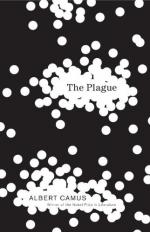|
|
The Plague Part 4 (Section 2)
M. Othon's son falls ill, forcing the whole family into quarantine. The son, Jacques, is very sick and it is decided that he will be the test case for Dr. Castel's newly concocted anti-plague serum. Rieux, Tarrou, Castel, Paneloux, and Grand keep watch at the bedside of the small boy as the serum takes effect. As the boy writhes in pain before them, all that watch are deeply affected. The serum does not work and the child dies, suffering horribly.
After the child's death, Dr. Rieux is very disturbed, and on his way out of the hospital gets into an argument with Father Paneloux. The priest, though distressed by the death, believes that the death is the act of God and cannot be questioned and "perhaps we should love what we can't understand." Rieux disagrees:
"No, Father. I've a very different idea of love. And until my dying day I shall refuse to love a scheme of things in which children are put to torture." Part 4, pg. 218
Father Paneloux, who has been working in the midst of the plague, gives his second sermon to the town. It is a windy day, and the church is barely three-quarters full, indicating, the narrator tells us, the general loss of religious fervor in the city, where superstition has replaced religion. In this sermon, Paneloux speaks more gently, and includes himself in his views, using the pronoun "we" rather than "you." And this time, rather than saying the plague was sent by God to punish sinners, Paneloux claims that as hard as it may be, Christians must try to find the good in bad situations. The sermon preaches Christian hope and faith rather than retribution. Paneloux tries to address the question he and Dr. Rieux argued about just after Jacques' death--how could there be a good God in a world where children can suffer? Paneloux's answer is that this is not something humans will necessarily be able to understand, no matter how hard they try--it is the will of God, and as Christians they must "believe everything or deny everything" (pg. 224). His philosophy, although it differs from Dr. Rieux's in that God is behind everything, is similar in its emphasis on doing your work in times of struggle and suffering:
"No, we should go forward, groping our way through the darkness, stumbling perhaps at times, and try to do what good lay in our power. As for the rest, we must hold fast, trusting in the divine goodness, even as to the deaths of little children, and not seeking personal respite." Part 4, pg. 227
Like Tarrou, who has had to move out of his hotel (he has gone to live at Dr. Rieux's house), the plague has forced Father Paneloux out of his residence. He moves in with a pious old lady, with whom Paneloux has a generally wordless and slightly stressed relationship. Not long after, the priest falls ill in her home. He refuses to see a doctor, saying it's against his principles, and seems indifferent to the disease that's taking hold. Dr. Rieux is eventually called in and Paneloux dies, clutching a crucifix. His death, however, is less violent than a typical plague death, and his case is recorded as a "Doubtful case."
It is All Soul's Day--the Day of the Dead--and the holiday passes without flowers or remembrances. The death toll is not rising, and just as an official meeting is about to happen to discuss making an announcement about how the mortality rate is still holding steady, Dr. Richard dies of the disease. Food is beginning to run seriously low in Oran, and profiteers are exploiting this state of affairs, selling limited food at a huge profit to people who have the money.
Tarrou and Rambert take Gonzales, who has consented to work in the anti-plague effort, to the city stadium, which is now serving as a quarantine camp. The detainees are quiet and idle--they don't want to think of death so they think of nothing. Tarrou also writes in his journal that these men are forgotten, even by those relatives who are thinking about how to get them out of the camp. Tarrou says:
"And that, too, is natural enough. In fact, it comes to this: nobody is capable of really thinking about anyone, even in the worst calamity." Part 4, pg. 241
At the camp, they run into M. Othon, who asks whether his son suffered much. Tarrou lies, saying he does not believe the boy did.




